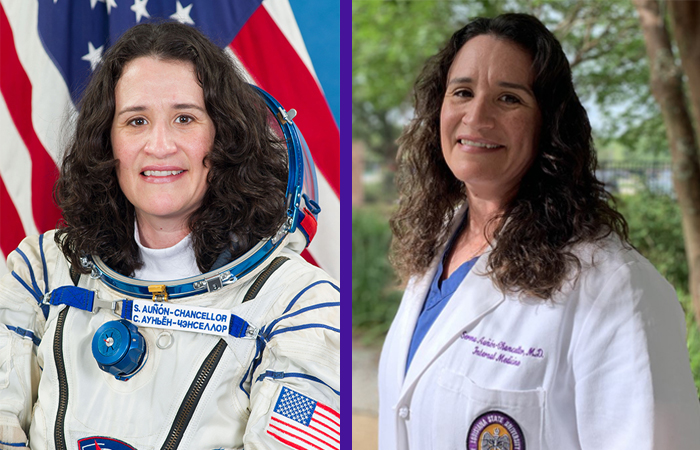New England Journal of Medicine Podcast Features LSU Health’s Astronaut Dr. Serena Aunon-Chancellor
Two Physician-Astronauts Discuss Aerospace Medicine
Leslie Capo, Director of Information Services
 Serena Auñon-Chancellor, MD, Clinical Associate Professor of Medicine at LSU Health
New Orleans School of Medicine’s Baton Rouge campus, is one of two physician-NASA
astronauts recently interviewed by the New England Journal of Medicine about aerospace
medicine. The Curbside Consult podcast, available here, was published online on January 3, 2023.
Serena Auñon-Chancellor, MD, Clinical Associate Professor of Medicine at LSU Health
New Orleans School of Medicine’s Baton Rouge campus, is one of two physician-NASA
astronauts recently interviewed by the New England Journal of Medicine about aerospace
medicine. The Curbside Consult podcast, available here, was published online on January 3, 2023.
A flight engineer on International Space Station Expeditions 56 and 57, Dr. Auñon-Chancellor spent 197 days in space. Back on earth, she continues working in the NASA Astronaut Office on medical issues and providing on-orbit support while also teaching LSU Health medical students and residents internal medicine and taking care of patients.
With the advent of commercial space, Dr. Auñon-Chancellor and her NASA colleague Dr. Michael Barratt, both double-boarded in internal and aerospace medicine, fielded questions about everything from physiologic changes in a gravity-free environment and medical certification of commercial space travelers to the aerospace medicine specialty.
They noted that pretty much every system in the body changes in zero gravity. After someone has been in space for a while, the body is almost extraterrestrial with different physiological norms. While medical monitoring data are constantly being gathered in space, the data cannot be analyzed until back on earth. One of the challenges aerospace and space medicine specialists are working on is being able to analyze data in real-time to make clinical decisions in orbit. Projects also include how to build medical kits for Mars, how to look at a lunar base, and more.
Part of NASA’s charter, aside from exploring and pushing the boundaries, is to try to open the space frontier.
Opening access through commercial space affords the opportunity to gather data from ordinary people who are less medically fit than NASA astronauts about the effects of space on health to solve or prevent health problems.
“We’re flying sicker people today than we have ever flown in the past,” notes Dr. Auñon-Chancellor. “Captain Kirk recently flew at age 90. Now we’re faced with a group of people who maybe in the past would never have been medically certified to fly as a NASA astronaut. For example, they have a past history of cancer, or they currently have coronary artery disease or atrial fibrillation.”
Medical certification is actively being decided by the FAA and several commercial flight entities.
“The neat thing about it is we are now gathering data on folks with co-morbidities that we’ve never had before,” adds Dr. Auñon-Chancellor. “This is now the era of the commercial space traveler, whether it’s a very short 30-minute mission or 12 days around the moon. I can’t wait to see what that will bring.”
The more information that is available, the more progress can be made for human health in space. The need for experts in aerospace medicine will also increase. Historically, physicians have not been required on missions. As space travel becomes more frequent, private concerns may well change that. In the meantime, aerospace physicians are working not only at NASA but also in the commercial space industry. They are becoming the subject matter experts who enable manned space exploration and moving civilization forward, potentially someday off Planet Earth.
